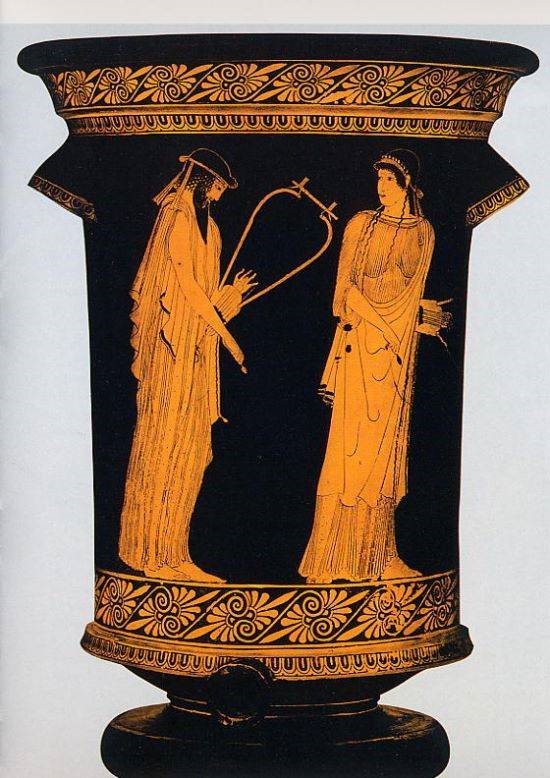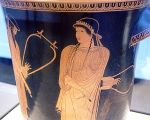Please note: I last taught this course in 2018. I have now retired from teaching at Mount Saint Vincent University, but you will find other versions of ENGL 2270 in the English Department’s course offerings from time to time.
Course at a glance
If you take this course, you will read Sappho’s lyric love poetry, Homer’s epic accounts of the Trojan War, Vergil’s tragic love story of Dido, and Ovid’s myths while examining how later writers and artists have adapted these ancient works in examples ranging from early modern poetry to contemporary popular culture.
Read more….
The influence of ancient Greek and Roman texts has permeated the Western tradition for millennia. In our sampling of some of these works, we will read the lyric love poetry of Sappho, Homer’s epic accounts of the Trojan War and its aftermath in The Iliad and Odyssey, selections from Virgil’s work, and excerpts from the mythological poetry of Ovid. One aim of the course will be to understand these texts in their own literary and historical contexts, but we will also look at how later writers and other artists have used these ancient works, with examples drawn from early modern poetry to contemporary popular culture, including the Coens’ film O Brother, Where Art Thou? and Margaret Atwood’s play, The Penelopiad. Key concepts for examination will include adaptation, influence, translation, parody, and appropriation.
This course requires the occasional use of Moodle to supplement the work done in class.

Texts
Our readings will include several versions of Sappho’s lyrics (in photocopies alongside the book ordered for the course), a good part of The Iliad, the whole of The Odyssey, a short excerpt from The Aeneid (online or in photocopies) and excerpts from Metamorphoses. Along with these texts from antiquity, we will also look at translations and adaptations in English literature, art, and film throughout the ages (mainly through online sources) and in Atwood’s play, The Penelopiad.
You can find these texts in the MSVU Bookstore:
- If not, Winter: Fragments of Sappho. Trans. Anne Carson.
- Homer. The Iliad. Trans. Peter Green.
- Homer’s The Odyssey. Trans. Richmond Lattimore.
- Ovid. Metamorphoses: A New Translation. Trans. Charles Martin.
- Margaret Atwood. The Penelopiad.
- A print or digital time management system (e.g. agenda or calendar
Along with these texts, we will also look at translations and adaptations in English literature, painting, sculpture, and dance throughout the ages.
Trailer for The Penelopiad, Nightwood Theatre 2013
Requirements
Writing assignments
- Essay: Literary analysis of two translations of Sappho. 1500 words.
15% of the final grade - Adaptation project: Adaptation in various media of a source text
and an analysis of 1500 words.
25% of the final grade - Annotated bibliography of three secondary sources. 10% of the final grade
- 5 online responses in the Moodle discussion forum. 10% of the final grade
Due dates will be announced in class and on the Moodle site. Further details about each assignment and instruction on essay writing will be given in class.
Attendance and participation
10% of the final grade
You need to be in class every day ready to work if you want to learn something and contribute to others’ learning, and if you want to be prepared for your writing assignments and exam. Attendance, of course, is part of your participation grade, but I will also take into account the quality and consistency of your contributions to class and group discussions. More details will be given in class. Demonstration of professional and courteous behaviour throughout the course will also contribute to this grade. Unprofessional and discourteous behaviour, such as texting, walking out of class in the middle of discussions, talking while others are discussing, watching non-course-related content on your computer, and not bringing the text to class, will have a detrimental effect on your participation and attendance grade.
Final exam
30% of the final grade
The final exam is an opportunity to think about the course readings in new combinations and from a broader perspective. Normally, the exam consists of passages selected from ones that we have discussed in class and that you are asked to identify, analyze, and compare. Obviously, the best preparation for the exam is attending every class, bringing the text with you, keeping up with the assigned readings, and taking notes on the class discussions, including marking which passages we analyze together in class, along with actively addressing comments made on your essays and exercises.
The Sirens. O Brother, Where Art Thou? Dir. Joel & Ethan Coen. 2000.
Moodle
This course uses Moodle, an online course management site, to supplement the information given in class. You can find a link to Moodle on the Mount webpages. You will be asked occasionally to use the discussion forum and possibly other features on the Moodle site. These features will be demonstrated in class. You will be expected to check the course Moodle site at least twice a week, preferably some time before each class, to make sure that you are up-to-date on all the latest course assignments, readings, and announcements.
Course Aims
With regular attendance, serious completion of all exercises and assignments, and taking
responsibility for your own learning based on given feedback, you can learn:
- about influential texts from Greek and Roman antiquity
- how texts from the past remain vital in subsequent ages in various media
- how to express your ideas in new and creative ways
- how to construct a coherent analysis of a text using the terminology of literary analysis
- how to plan, organize, draft, revise, and edit an essay
- how to evaluate, synthesize, and document sources
- how to give and take constructive feedback
- how to present ideas orally in a small group and work efficiently and respectfully in collaboration with others
Experiential (hands-on) learning:
Experiential or hands-on learning is integrated into all ENGL/WRIT courses, which include activities that are directly relevant to the type of work undertaken by English graduates in their later careers, such as oral and written communication, research, and collaborative work. For more ideas on available opportunities, check out the English Department page on “Experiential (hands-on) learning.”
Dido’s Lament. Mark Morris. 1989.
Links
The Perseus Digital Library. Tufts University. A huge site that contains texts and images.
Classical Myth: The Ancient Sources. Laurel Bowman, University of Victoria. This site contains images, texts, a timeline, and other useful information.
Diotima: Materials for the Study of Women and Gender in the Ancient World.
 The image used above is a detail from an Attic vase (c. 470 BCE) illustrating Sappho and Alcaeus. This image is taken from Wikimedia Commons. Information about the vase can be found in the Perseus Digital Library. The banner image at the top of the page is from arshtcenter.org and illustrates Mary Zimmerman’s play, Metamorphoses.
The image used above is a detail from an Attic vase (c. 470 BCE) illustrating Sappho and Alcaeus. This image is taken from Wikimedia Commons. Information about the vase can be found in the Perseus Digital Library. The banner image at the top of the page is from arshtcenter.org and illustrates Mary Zimmerman’s play, Metamorphoses.

One response to “Love, War, Myth: From Classical to Contemporary Arts”
[…] read for sheer pleasure, although I initially picked it up because I thought it might suit my Classical Traditions in English Literature course, where we read works from Greek and Latin antiquity alongside later adaptations. A review I had […]
LikeLike